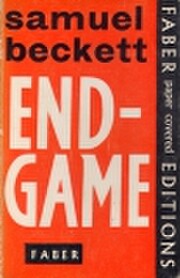

Click on a thumbnail to go to Google Books.
|
Loading... Endgame : a play in one act followed by Act without words : a mime for one player (original 1957; edition 1964)by Samuel Beckett
Work InformationEndgame / Act Without Words by Samuel Beckett (Author) (1957)
 Books Read in 2022 (1,148) 20th Century Literature (599) » 10 more Books Read in 2024 (2,042) Modernism (86) Books Read in 2009 (115) Existentialism (60) Troublesome bodies (60) No current Talk conversations about this book. In ‘Waiting For Godot’, Beckett’s characters wait for a man who symbolizes God or a higher meaning who will never arrive, making clear his view on life’s meaninglessness. In ‘Endgame’, with their bodies broken down, his characters live out their colorless, boring days, simply waiting for death. He holds an uncomfortable mirror up to the human condition and the end of our lives, and does so in an artistic way. It’s symbolic that one of them can’t see or stand, and another can’t sit, and sees nothing but grayness or ‘zero’ out of their room’s high windows. The parents of the one live literally in ashbins. We will all die, Beckett reminds us grimly, many no longer enjoying life in the slightest when it happens, and some of us will cling to another simply because of that age-old adage, ‘misery loves company’. One wonders if the events of the play, as simple as they are, with repetitious seemingly interior dialogue, are all in this one old and beaten down individual’s mind at the end of his life - his memories of his parents, his fear that his partner and caretaker will leave him, and his bitterness over the futility of life. The play has a dark and pessimistic view of humanity as well. In one of several moments which seem post-apocalyptic, a flea should be caught because “humanity might start from there all over again,” which would be a bad thing, presumably because our lives are so shallow, meaningless, and filled with pain. There are some moments of levity in Beckett’s wordplay, e.g. the story of the tailor who apologizes among other things for having “made a hash of the crotch”, as well as an elder “sucking his biscuit”, and the admonition to “Get out of here and love one another! Lick your neighbor as yourself!” However, I found these to be few and far between. The story is one of recognizing our fate to suffer (“He’s crying” / “Then he’s living.”), and have no real hope (“Use your head, can’t you, use your head, you’re on earth, there’s no cure for that!”). It’s also one of cautionary warning (“One day you’ll be blind, like me. You’ll be sitting there, a speck in the void, in the dark, for ever, like me.”) The trouble I have with the play is it's rather bleak. Life does end in degradation and suffering, but we can still lead full, beautiful lives, connect to others, and be happy in spite of the smallness of humanity, and life’s absurd daily repetition. Maybe his play is a cautionary warning about the end that awaits us all, and that we should go outside in the sunshine and enjoy our time while we can, but it just comes across as so grim and pessimistic, it's harder for me to fully enjoy. I'm rating this based on the script for Endgame, which I think is scarier and funnier than Waiting for Godot. It's essential Beckett, so if you don't know what you're getting into, my advice is to be prepared. The humor is often in the performance of the lines, and without the context of the staging, only the bleak and repetitive elements emerge. If that were all that was on offer, I would not rate it so highly. no reviews | add a review
Is contained inContainsHas as a student's study guide
Samuel Beckett was awarded the Nobel Prize for Literature in 1969; his literary output of plays, novels, stories and poetry has earned him an uncontested place as one of the greatest writers of our time. Endgame, originally written in French and translated into English by Beckett himself, is considered by many critics to be his greatest single work. A pinnacle of Beckett's characteristic raw minimalism, it is a pure and devastating distillation of the human essence in the face of approaching death. No library descriptions found. |
Current DiscussionsNonePopular covers
 Google Books — Loading... Google Books — Loading...GenresMelvil Decimal System (DDC)842.91Literature French & related literatures French drama 1900- 20th centuryLC ClassificationRatingAverage: (3.82) (3.82)
Is this you?Become a LibraryThing Author. |
||||||||||||||||||||||||||||||||||||||||||||||||||||||||||||||||||||||||||||||||||||||||||||||||||||||||||||||||||||||||||||||||||||||||
I read this in a hospital.
This morning.
The patient was someone I don't know very well.
It was thought that my presence would afford authority.
I am not sure about that.
The senseless ritual of life is unveiled in a drab flourish by Beckett. I love it. This isn't is powerful as Godot. There's no hope here -- for other than Death. There is memory and within that there's reverie, there's a lilting note which conveys. Our chores elongate without purification. I can sit and ponder the motives of the many gathered in this plush internment. I can also sit and not ponder. (